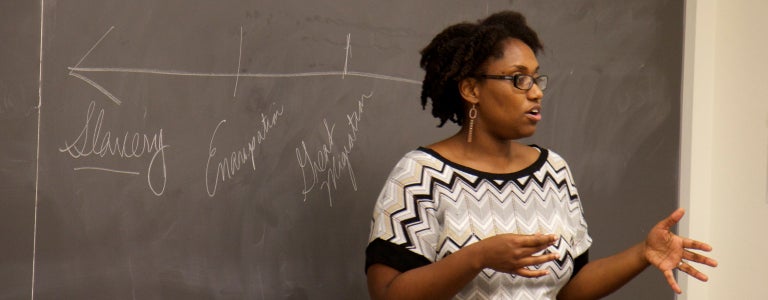The #Ferguson Syllabus
August 27, 2014—In the wake of a delayed school year in Ferguson, Missouri, Assistant Professor of History Marcia Chatelain started the #FergusonSyllabus Twitter campaign as a way for educators to share ideas on how to talk about Ferguson in their classrooms. “I wanted to help other professors find a way to talk about this tragedy in the context of how it would affect our students’ first day of school,” Chatelain explained. With books and articles for every age, the crowdsourced syllabus addresses race, policing, African American history, and civil rights in the United States.

Marcia Chatelain, an assistant professor in the Department of History, created the #FergusonSyllabus in response to recent events in Ferguson, Missouri.
Georgetown College: Why did this moment of civil unrest prompt you to start the Ferguson Syllabus?
Marcia Chatelain: I think it’s important to acknowledge major, current events, and from where I sat, Ferguson was unlike anything most, traditional-age students had ever experienced. I remembered unrest in Los Angeles in 1992 and feeling so overwhelmed by all of it. I realized that the majority of our students were too young to remember this or were not even born yet. I felt it was important to create a way for other educators concerned about how students understood what happened, and I simply want people to commit to thinking about ways to talk about it.
GC: What are the particular challenges that teachers face when responding to a situation like this?
MC: I think some people assume that they have to be experts on the dimensions of the precipitating event or they are afraid that talking about Ferguson will unleash discord in the classroom. I think educators have to focus on the bigger picture of how these moments lead us to debate aspects of our society that can be unpleasant, but remember that it is robust and respectful conversation that will ultimately change the world. I have no desire to promote contentious debates about individuals in Ferguson—I think that is happening in a lot of places—rather, I would like to know that we are talking about finding meaning in tragedy by opening up our minds to seeking answers to the larger questions.
GC: What were your first suggestions for the Ferguson Syllabus?
MC: I suggested a lot of material I work with in my classes—masterful works on urban history, white flight, school desegregation, unrest in the 1960s, and the dynamics of race and political participation.
GC: Have you been surprised by the number of contributions to the syllabus?
MC: First, I’m surprised by the number of educators on Twitter—I think it’s great. I’m just surprised by how much attention this has received. It’s really a small idea and a small gesture in light of all the work people on the ground in Ferguson have done and are doing, but it’s gratifying to see the collegiality and camaraderie among folks across disciplines, regions, and educational settings. I’ve also been pleased by how many people are excited to read new things!
GC: Have you spoken to any teachers in Ferguson about how they plan to address the conversation in their classrooms?
MC: Yes, via Twitter and e-mail. I’ve been in contact with educators who reach students of all ages, and they have isolated an aspect of their teaching plans that relate to the big issues Ferguson brings forth—from leadership to due process to the role of the press to the history of St. Louis’s racial conflict and communities. I’m impressed by how teachers in a number of settings are thinking through how to provide relevant and productive topics of discussion.
GC: How will you be teaching Ferguson in your classroom this fall?
MC: In my Ignatius Seminar, I will talk to my students about the fact that with the delay of school in Ferguson, some children did not have access to school breakfast and lunch. There were fundraisers to feed children out of school. This fact of Ferguson is a wonderful entry point to talk about the school lunch program, the burden poor children bear in times of crisis, and the way that supporters of the Ferguson community responded to this need. Again, it’s a way of connecting an aspect of this narrative to the topic of the course in order to go deeper about poverty and resources in Ferguson, and many communities like it throughout the country.
I am also teaching an African American women’s history class, and I’ll teach about the women leaders who emerged in the Ferguson crisis and the gendered nature of the conversation surrounding police and community tensions, as well as the absence of women in some of the response to Ferguson.
GC: What is the Freedom Ferguson Library and how can people participate?
MC: The idea for the Freedom Ferguson Library is as simple as the Ferguson Syllabus. I’m asking the people who benefited from the suggestion to consider donating an item to an under-resourced school, prison literacy program, or community center. I’ve asked people write (or make a nameplate) with a message and the words Ferguson Freedom Library. The expression Freedom Library comes from the Freedom Summer Project of 1964. Civil rights activists created Freedom Schools to educate children and adults alike!
More on the Ferguson Syllabus
Marcia Chatelain’s recent article “How to Teach Kids About What’s Happening in Ferguson” in the Atlantic includes books, articles, films, and poems from the crowdsourced Ferguson Syllabus. You can follow the conversation on Twitter by using and searching for the hashtags #FergusonSyllabus and #FergusonFreedomLibrary.
On Thursday, August 28, 2014, Georgetown University hosted “Reflections on Ferguson.” Panelists included Paul Butler, professor of law; Marcia Chatelain, assistant professor of history; Michael Eric Dyson, university professor of sociology; Peter Edelman, professor of law; Maurice Jackson, associate professor of history; and Douglas Reed, associate professor of government. The panel was moderated by Provost Robert Groves.